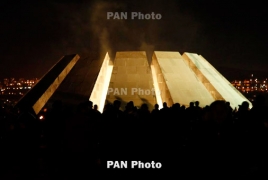Washington Institute demands that Trump block Armenian Genocide bill January 14, 2017 - 12:37 AMT PanARMENIAN.Net - The Washington Institute for Near East Policy (WINEP) has called on United States President-Elect Donald J. Trump to “guarantee” to Turkey that the Armenian Genocide will not be properly acknowledged by the U.S. Congress, in a recently published set of proposals regarding “U.S. Policy on Turkey,” The Armenian Weekly reports. “The United States can quietly guarantee Turkey that the Armenian Genocide resolution in Congress will not pass. This has always been critical in the relationship, and most Turks care deeply about the issue,” reads a part of the paper authored by former U.S. ambassador to Ankara James F. Jeffrey and Turkish scholar Dr. Soner Cagaptay. The paper on U.S.-Turkey relations is the first in a series of WINEP presidential transition papers addressing key policy challenges across the Middle East. In it, the two authors argue that the Trump administration should “revamp policy toward Turkey to emphasize a transactional approach to critical bilateral issues.” A new approach to Turkey, Jeffrey and Cagaptay suggest, would restore focus to each side’s most important interests. “For Turkey, this includes the extradition of reputed coup plotter Fethullah Gulen; increased engagement on issues from Cyprus to Israel; and closer attention to Turkish equities in the Syria conflict. For the United States, a new approach would entail a stronger commitment to fighting the Islamic State; a return to peace talks with the Kurdistan Workers Party (PKK); closer cooperation on military moves, especially in Syria; and renewed respect for democratic freedoms,” reads a part of a statement released by the Washington Institute about its first “Transition 2017” paper. The Armenian National Committee of America (ANCA) reacted to the news of the publication via social media and other channels. “Why is [the Washington Institute] providing a platform for calls to block remembrance of a known case of genocide?” asked the ANCA in a tweet to Washington Institute Executive Director Robert Satloff.  The Armenian Genocide The Armenian Genocide (1915-23) was the deliberate and systematic destruction of the Armenian population of the Ottoman Empire during and just after World War I. It was characterized by massacres and deportations, involving forced marches under conditions designed to lead to the death of the deportees, with the total number of deaths reaching 1.5 million. The EU does not intend to conduct military exercises with Armenia, Lead Spokesperson for EU Foreign Affairs and Security Policy Peter Stano says. A telephone conversation between Putin and Pashinyan before the CSTO summit is not planned, Peskov says. London’s Armenian community has been left feeling “under attack” after the city’s Genocide monument was vandalised. The United States believes there should be an international mission to provide transparency. Partner news |